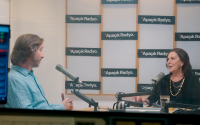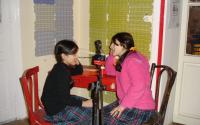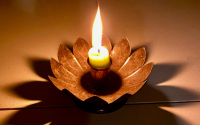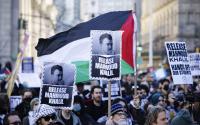Karl Vick10 April 2005
ISTANBUL, April 9 -- In Turkey, heralded as the model of a Westward-looking Muslim democracy, sales records were shattered this spring by a book that imagines a U.S. invasion of this nation, a longtime U.S. ally. Polls show an overwhelming majority of Turks regard that scenario as a real possibility.
Mainstream newspapers here routinely mock U.S. troops in Iraq, and many feature breathless but unsubstantiated reports of American atrocities there, including mythical accounts of troops harvesting organs from dead civilians. One paper announced the U.S. offensive against Fallujah in November with a photo illustration of President Bush wearing a swastika.
Conspiracy theories, a staple topic at teahouses and water coolers, are now taken so seriously that in December the U.S. Embassy felt compelled to issue a statement denying that the United States had caused the tsunami in South Asia and, with it, the deaths of more than 200,000 people.
As the Bush administration ramps up efforts to improve the American image in the Muslim world, the magnitude of the challenge is starkly visible in this country of 70 million, long seen as a bridge between East and West. Polls suggest that few countries have turned more dramatically against the United States than Turkey.
The latest survey, gathered in February by the private Metropoll organization, found that four in 10 Turks regard the United States as their country's "biggest enemy." That is more than double the number who named Greece, the ancient rival Turkey has come to the brink of war with three times in the last half-century.
"Yes, definitely, the opinions are changing," said Ismail Baykus, 45, at the door of his stationery store in a middle-class Istanbul neighborhood. "Based on what we hear and see in the press, the Americans talk one way and then act another, especially when they say they will bring stability and peace to a region."
"They're all lies!" shouted an elderly fruit seller standing nearby. "All lies!"
By all accounts, the turnabout can be traced to the 2003 invasion of Iraq. Some 90 percent of Turks opposed the war, and their parliament voted to deny the U.S. Army's 4th Infantry Division permission to open a northern front against Iraq from Turkish territory.
When the war ended after just three weeks, 82 percent of Turks said they were disappointed that Iraq's military did not put up a better fight.
"It obviously all starts with Iraq," said a senior Western diplomat in Ankara. "All this is going on in the context of the U.S. sending 140,000 troops next door."
But more than two years later, U.S. officials voice growing concern that the rift between the two governments not only has not healed, but is deepening.
The tangle of sentiments working against Washington and any new effort to reverse the trend are not easily sorted. Nostalgia for the Ottoman Empire, which ruled the entire Middle East from Istanbul, plays a role. So does the fierce nationalism on which modern Turkey was founded in the 1920s by the revered Kemal Ataturk, who worked hard to push religion out of public life and orient the new nation-state toward the prosperity and progress he saw in the West.
But while Turkey is a secular republic, it is populated by Muslims, whose faith defines the community of Islamic believers as one body, the umma. When the Pew Research Center surveyed global attitudes on the Iraq invasion, Turkish "unfavorable" views toward the United States clustered around 80 percent, the same level reported in the Islamic Republic of Pakistan.
"It was obvious after September 11 that the United States was going to feel provoked and attack a Muslim country," said Sezai Oflaz, 33, carving meat in a kabob restaurant overlooking the Bosporus Strait, which divides Europe from Asia through the center of Istanbul.
"It looks like it will come to this: First they invade Iraq, then maybe Iran and Syria. Eventually, Turkey. So rather than waiting for it, I'd rather go and fight now in Iraq," Oflaz said.
The complexion of Turkey's current government encourages empathy with fellow Muslims. Though Prime Minister Recep Tayyip Erdogan says that he no longer promotes political Islam and that his party respects Turkey's secular constitution, its 2002 election on a populist platform clearly broadened what passes for acceptable political discourse in Turkey.
In November, the chairman of the parliament's human rights committee described the U.S. offensive in Fallujah as "genocide." Erdogan referred to "hundreds martyred" in the insurgent stronghold.
The most sensational claims of U.S. atrocities surface in Yeni Safak, a moderately religious newspaper often described as Erdogan's favorite.
"It's interesting that only Yeni Safak picked this up," a U.S. diplomat, speaking on condition of anonymity, said of a spurious report that the Marines had used chemical weapons in Fallujah. With a copy of a volume titled "Understanding Anti-Americanism" on the desk beside his phone, the diplomat traced the Fallujah rumor from a pro-al Qaeda Web site to a Cuban news service to Yeni Safak. The chronology was posted on the embassy's Web site, beside a Cold War-era tutorial offering reporters tips on how to spot disinformation.
"But there is anti-Americanism in some of the most secular press," the diplomat added. "You can't say it's uniform. It comes from different places."
The authors of the best-selling "Metal Storm" say wounded pride informed its popular plot.
The thriller, set in 2007, has been criticized for depicting Turkey's proud military as collapsing easily under an American onslaught, launched from a conquered Syria at the behest of an American industrialist. According to the book, the man had found a use for boron, a mineral that, like hazelnuts, Turkey has more of than the world knows what to do with.
But co-author Burak Turna, a lanky graduate of American University in Cyprus, said the book -- in which a Turk replies to the invasion by detonating a nuclear suitcase bomb outside the White House -- was intended as a wake-up call.
"I think people were forgetting how important Turkey is," said Burak Turna. "Even some Turks had forgotten."
A sense that the importance of Turkey's role in the world is beyond question colors almost every conversation with its citizens, whom a Pew survey calculated may be the only people in the world more patriotic than Americans. Their identification with the state in many cases appears to add a personal quality to the Ankara government's specific complaints over the Iraq war.
Turkey continues to press Washington to confront a guerrilla army of separatist Turkish Kurds based in Iraq's north and to protect Turkish-speaking populations in Tall Afar and Kirkuk. And more than 18 months later, the humiliating July 4, 2003, arrest of Turkish army special forces by American soldiers in northern Iraq remains a raw topic.
"It's very important," Baykus said. "If we are friends, why did you do that to us?"
"I also wonder," the stationer added, "if the U.S., being a great power, is also a little bit jealous of Turkey."
The other author of "Metal Storm" is Orkun Ucar, a burly heavy-metal fan who suggested the truck bombs that killed 61 people in Istanbul last year were arranged by the United States to punish Turkey for not cooperating in Iraq. He expressed deep offense that the Bush administration was not consulting Turkey on its every move in the Middle East.
"Turkey is a puppet master," Ucar said. "It's a player."
When Secretary of State Condoleeza Rice, in Ankara last month, asked Foreign Minister Abdullah Gul to rein in criticism of a longtime ally, Gul pointed out that Turks are irked by how they are portrayed in the U.S. media.
Cagri Kaya, a graduate student at Ankara's Bilkent University, offered an example in an interview. "I was watching '24,' and one of the terrorists was Turkish," Kaya said. Compounding the offense, Kaya added, was a sloppiness that lumped Turks with the Arabs they had ruled in Ottoman times: "He spoke Arabic, not Turkish, and looked like he was Saudi."
There is some evidence that diplomacy is having an effect. Since Rice's visit, U.S. officials have noted a sharp drop in critical comments by Turkish officials, at least. And Erdogan is scheduled to visit Washington in June.
But the authors of "Metal Storm" cited themselves as evidence that, among ordinary Turks, perceptions have changed profoundly in a country that long served as Washington's most reliable ally in the Muslim world.
"The canary the U.S. took down in the mine is dead," Ucar said. "But they haven't noticed."
http://www.washingtonpost.com/ac2/wp-dyn/A41024-2005Apr10?language=printer






